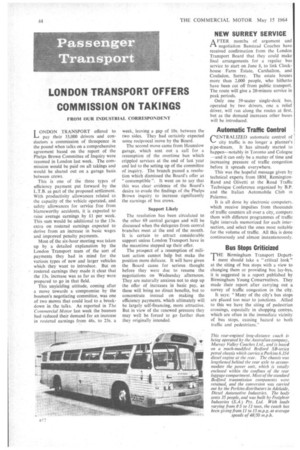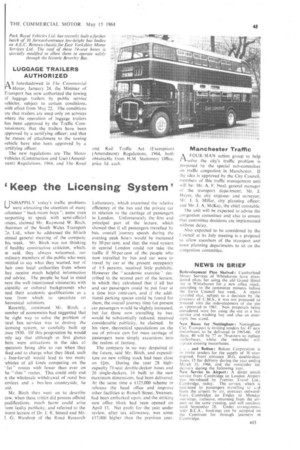LONDON TRANSPORT OFFERS COMMISSION ON TAKINGS
Page 46

Page 47

If you've noticed an error in this article please click here to report it so we can fix it.
FROM OUR INDUSTRIAL CORRESPONDENT
LONDON TRANSPORT offered to .1-4 pay their 33,000 drivers and conductors a commission of threepence in the pound when talks on a comprehensive agreement based on the report of the Phelps Brown Committee of Inquiry were resumed in London last week. The commission would be paid on all takings and would be shared out on a garage basis between crews.
This is one of the three types of efficiency payment put forward by the L.T.B. as part of the proposed settlement. With productivity allowances related to the capacity of the vehicle operated, and safety allowances for service free from blameworthy accidents, it is expected to raise average earnings by El per week. This sum would be additional to the 13s. extra on rostered earnings expected to derive from an increase in basic wages and improved penalty payments.
Most of the six-hour meeting was taken up by a detailed explanation by the London Transport team of the sort of payments they had in mind for the various types of new and larger vehicles which they want to introduce. But on rostered earnings they made it clear that the 13s. increase was as far as they were prepared to go in that field.
This unyielding attitude, coming after a move towards a compromise by the busmen's negotiating committee, was one of two moves that could lead to a breakdown in the talks. As reported in The Commercial Motor last week the busmen had reduced their demand for an increase in rostered earnings from 46s. to 23s. a
week, leaving a gap of 10s. between the two sides. They had certainly expected some reciprocal move by the Board.
The second move came from Hounslow garage, which sent out a call for a resumption of the overtime ban which crippled services at the end of last year and led to the setting up of the committee of inquiry. The branch passed a resolution which dismissed the Board's offer as "contemptible". It went on to say that this was clear evidence of the Board's desire to evade the findings of the Phelps Brown inquiry to increase significantly the earnings of bus crews.
Support Likely The resolution has been circulated to. the other 69 central garages and will be discussed when the delegates from central branches meet at the end of the month. It is certain to attract considerable support unless London Transport have in the meantime stepped up their offer.
The prospect of a resumption of militant action cannot help but make the position more delicate. It will have given the Board cause for serious thought before they were due to resume the negotiations on Wednesday afternoon. They are naturally anxious not to step up the offer of increases in basic pay, as these will bring no direct benefits, but to concentrate instead on making the efficiency payments, which ultimately will be largely self-financing, more attractive. But in view of the renewed pressure they may well be forced to go farther than they originally intended.
NEW SURREY SERVICE
FTER months of argument and fl negotiation Banstead Coaches have received confirmation from the London Transport Board that they could make final arrangements for a regular bus service to start on June 8, to link Clockhouse • Farm Estate, Carshalton, and Coulsdon, Surrey. The estate houses more than 2,000 people, who hitherto have been cut off from public transport. The route will give a 20-minute service in peak periods.
Only one 39-seater single-deck bus, operated by two drivers, one a relief driver, will run along the routes at first, but as the demand increases other buses will be introduced.
Automatic Traffic Control
rENTRALTZED automatic control of
city traffic is no longer a planner's pipe-dream. It has already started to happen—notably in Toronto and Cologne —and it can only be a matter of time and increasing pressure of traffic congestion before it spreads everywhere.
This was the hopeful message given by technical experts from IBM, RemingtonRand and Olivetti at the Road Traffic Technique Conference organized by B.P. and the Italian Automobile Club in Palermo.
It is all done by electronic computers, which receive impulses from thousands of traffic counters all over a city, compare them with different programmes of traffic light intervals memorized for each intersection, and select the ones most suitable for the volume of traffic. All this is done continuously and almost instantaneously.
Bus Stops Criticized
THE Birmingham Transport Depart]. ment should take a "critical look" at the siting of bus stops with a view to changing them or providing bus lay-bys, it is suggested in a report published by Birmingham Young Conservatives. They made their report after carrying out a survey of traffic congestion in the city.
It says: "Many of the city's bus stops are placed too near to junctions. Allied to this we have the siting of pedestrian crossings, especially in shopping centres, which are often in the immediate vicinity of bus stops, causing hazard to both traffic and pedestrians."
LUGGAGE TRAILERS AUTHORIZED
S foreshadowed in The Commercial Motor, January 24, the Minister of ranspOrt has now authorized the towing af luggage trailers by public service vehicles, subject to certain conditions, with effect from May 22. The conditions are that trailers are used only on services where the operation of luggage trailers has been approved by the Traffic CornMssioners; that the trailers have been ipproved by at certifying officer; and that he means of attachment to the towing vehicle have also been approved by a :ertifying officer.
The new regulations are The Motor Vehicles (Construction and Use) (Amendtient) Regulations, 1964, and The Road and Rail Traffic Act (Exemption) (Amendment) Regulations, 1964. both obtainable from H.M. Stationery Office. price 3d. each. Manchester Traffic PAA FOUR-MAN action group to help solve the city's traffic problem is proposed by the special sub-committee on traffic congestion in Manchester. If the idea is approved by the City Council, members of this traffic management unit will be: Mr, A. F. Neal, general manager t)t. the transport department; Mr. J. Hayes, the city engineer and surveyor; Mr. J. S. Millar, city planning officer; and Mr. J, A. McKay, the chief constable,
the unit will be expected to advise the congestion committee and also to ensure that committee decisions are implemented without delay.
Also expected to be considered by the Council at its July meeting is a proposal to allow members of the transport and town planning departments to sit on the congestion committee.




































































































































